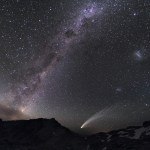SDSS
"On a cosmic scale, our life is insignificant, yet this brief period when we appear in the world is the time in which all meaningful questions arise." -Paul Ricoeur
Ask anyone who's looked up at a dark sky on a clear, moonless night, and you'll immediately hear tales about how incomprehensibly vast the Universe is.
Image credit: Randy Halverson, flickr user dakotalapse, from http://dakotalapse.com/.
But what you're looking at isn't much of the Universe at all. In fact, practically every point of light you see, including the vast swath of stars too dim to individually resolve, comes from…
"Who are we? We find that we live on an insignificant planet of a humdrum star lost in a galaxy tucked away in some forgotten corner of a universe in which there are far more galaxies than people." -Carl Sagan
Our night sky, quite literally, is our window to the Universe.
Image credit: Miloslav Druckmuller, Brno University of Technology.
Well, it's kind of a window to the Universe. I say only "kind of" because, with the exception of those two faint, fuzzy clouds in the lower right, everything else visible in the image above is part of our own Milky Way galaxy. In fact, practically…
The Sloan Digital Sky Survey just released their largest 3-D data set, positions and redshifts, as part of their 9th data release.
Here is the fly through.
Awesome, eh?
Last week, Pamela Gay over at Star Stryder pointed me to a press release which claimed that, among other things, perhaps dark matter wasn't necessary. So I wrote a guest post on her blog explaining why it was. Apparently, some people still aren't convinced. So I will lay out for you all the reasons I can think of why we need it, and explain what happens if you try to do without it.
1. Cluster Velocity Dispersions. When we take a look at galaxies, we often find hundreds or even thousands of them clustered together, like in the Coma Cluster. We can measure how quickly those galaxies are moving…


